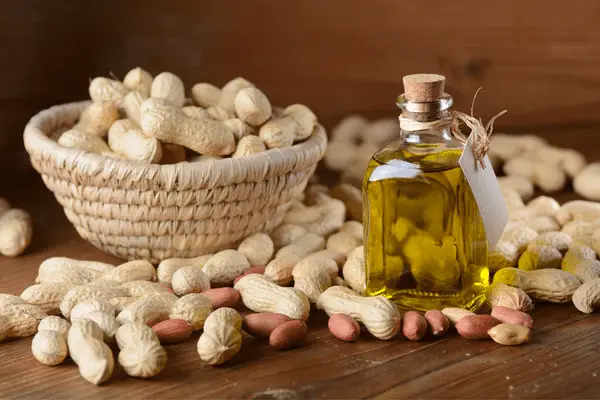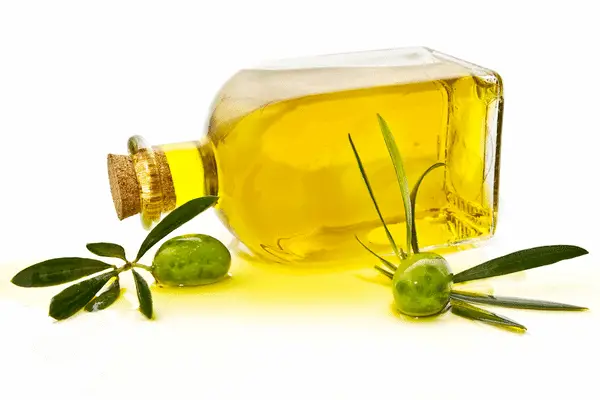A variety of oils can be used for cooking, each with its own set of benefits and drawbacks. Peanut oil and olive oils are two of the most popular oils for cooking and alternative uses.
Though they have some similarities, there are some critical differences between the two that you should know before making a choice.
Let’s take a closer look at each one to see which is right for you.
The Health Benefits of Both Oils
Are you curious about the health benefits of peanut oil vs. olive oil? Each type of oil has unique properties that make it perfect for different uses.
Here, we’ll take a closer look at the benefits of both oils:
The Health Benefits of Peanut Oil

Peanut oil has many health benefits, making it an excellent choice for consumption. Peanut oil also has a robust flavor, which some say makes their dishes more delicious.
Monounsaturated fats are a healthy type of fat that is found in peanut oil. They are beneficial for the heart because they help lower LDL cholesterol levels and improve HDL cholesterol levels. This can help to reduce the risk of heart disease.
Peanut oil has a high smoke point, making it a good choice for cooking at high temperatures. This is because peanut oil is less likely to oxidize and produce harmful compounds when heated.
This makes it a healthier choice for cooking than other oils, such as vegetable oil.
The antioxidants found in peanut oil can help protect the body against disease. These antioxidants neutralize harmful compounds that can damage cells and cause disease.
Some diseases that peanut oil can help protect against include cancer and Alzheimer’s disease.
Peanut oil is a good source of many vitamins and minerals, including vitamin E, magnesium, and potassium. These nutrients are essential for maintaining good health and preventing illness.
The Health Benefits of Olive Oil

Olive oil has many health benefits that make it a noteworthy competitor to peanut oil.
Olive oil is also high in monounsaturated fats, which are beneficial for heart health. Like peanut oil, olive oil is a good choice for those looking to improve their cholesterol levels and reduce their risk of heart disease.
Olive oil is a good source of antioxidants, which can help protect the body against inflammation and disease. These antioxidants work to neutralize harmful compounds that can damage cells and cause disease.
Like peanut oil, diseases that olive oil can help protect against include cancer, Alzheimer’s disease, and arthritis.
Olive oil is a good source of many vitamins and minerals, including vitamin E, magnesium, and potassium. These nutrients are essential for maintaining good health and preventing disease.
How Each Oil is Used in Cooking
Now that we’ve looked at the health benefits of each oil, let’s see how they are used in cooking:
Peanut Oil
Peanut oil can be used for frying, sautéing, and baking. It is also sometimes used as a salad dressing or as a sauce base.
Regular Peanut Oil
If you’re looking for a healthy cooking oil that can be used for various dishes, regular peanut oil is a good choice.
Cold-Pressed Peanut Oil
Like regular peanut oil, cold-pressed peanut oil is high in monounsaturated fats and has a high smoke point. However, cold-pressed peanut oil also contains more nutrients than regular peanut oil.
Roasted Peanut Oil
Roasted peanut oil is the most distinctly noted for its flavor. It’s ideal for use as a finishing oil or in recipes that traditionally call for butter or margarine.
When choosing peanut oil, it is crucial to remember that unrefined peanut oil can go rancid quickly. Peanut oil should be stored in a cool, dark place and used within six months of opening.
Olive Oil
Olive oil is a type of vegetable oil extracted from olives, the fruit of the olive tree. It is a popular ingredient in many cuisines and has many uses in cooking. Olive oil can be used for frying, sautéing, or roasting. It can also be used as a condiment or dressing, added to salads or pasta dishes.
There are many types of olive oil to consider:
Extra-Virgin Olive Oil
Extra-Virgin Olive Oil is the highest quality olive oil. It is made from pure, cold-pressed olives and has the most antioxidants and nutrients of any olive oil. It also has a high smoke point, making it ideal for frying and other high-heat cooking methods.
Extra-Virgin Olive Oil is also the most expensive type of olive oil.
Virgin Olive Oil
Virgin Olive Oil is made from pure, cold-pressed olives but contains fewer antioxidants and nutrients than Extra-Virgin Olive Oil. It also has a lower smoke point, so it is not as ideal for high-heat cooking.
Virgin Olive Oil is less expensive than Extra-Virgin Olive Oil but more expensive than other types of olive oil.
Refined Olive Oil
Refined olive oil is a type of vegetable oil made from olives that have been processed to remove the bitter taste. It is also lower in antioxidants and nutrients than Extra-Virgin or Virgin Olive Oil. Refined Olive Oil has a high smoke point, making it ideal for frying and other high-heat cooking methods.
The Taste Difference Between the Two Oils
While peanut and olive oil have their merits, they also have distinctly different flavors. Peanut oil is often used in Asian cuisine for its nutty flavor, while olive oil is a staple in Mediterranean cooking because of its fruity taste.
If you prefer the flavor of peanut oil, then you’ll probably want to use it more often in your cooking.
On the other hand, if you’re not a fan of the taste of peanut oil, then you might want to stick with olive oil instead.
Either way, both oils can be used in various dishes, so it’s really up to you to decide which one you prefer.
Price Comparisons Between the Two Oils
Let’s take a look at the cost of peanut oil vs. olive oil.
Peanut oil is usually less expensive than olive oil. However, it has a relatively short shelf life and can go rancid quickly.
Olive oil, on the other hand, has a longer shelf life and is less likely to go bad. So if you’re looking for an oil that will last longer, olive oil is a better choice.
In terms of taste, peanut oil has a strong flavor, while olive oil has a slightly bitter taste.
Some people prefer the flavor of peanut oil, while others find it too strong. Ultimately, it’s up to you to decide which flavor you prefer.
Peanut oil is a good choice for those who want a cheap, flavourful oil. Olive oil is a better choice for those who don’t mind spending a bit more and who enjoy the taste of olive oil.
Which Oil is Better for You
A person should consider all of the comparisons between peanut oil and olive oil to make the right choice on which one is best for their individual needs. Peanut oil is less expensive than olive oil. It has a much higher smoke point than olive oil, so it can be used for cooking at higher temperatures.
Peanut oil also has a strong flavor, which will significantly alter your food taste.
Olive oil is healthier than peanut oil because it contains more monounsaturated fats, which can lower cholesterol levels and reduce the risk of heart disease. It also contains antioxidants, which can protect against cell damage.
However, olive oil has a lower smoke point than peanut oil, so it should not be used for cooking at high temperatures. It also has a strong flavor that some people may not prefer.
When choosing between peanut oil and olive oil, you should consider your budget, cooking temperature, and personal preference to make the best decision for your needs.
To Close
Both peanut oil and olive oil have their own unique health benefits that should be considered when making the decision of which oil to cook with.
Both oils are excellent sources of monounsaturated fats, vitamin E, and antioxidants, but olive oil also contains healthy polyunsaturated fats and anti-inflammatory agents.
Although there is a major taste difference between the two oils, price comparisons show that they are relatively equal in cost.
Ultimately, the best choice for you will depend on your individual dietary needs and preferences. Have you tried cooking with peanut or olive oil? What are your thoughts on the taste difference?
